#and the two most significant people they find there are laura-- whose narrative purpose is over now other logan is dead
Explore tagged Tumblr posts
Text
I wish I could articulate my earnest and sincere feelings about the usage of "I'll Be Seeing You" in Deadpool and Wolverine but unfortunately I can't take myself seriously long enough to string my thoughts together.
#the song is a tender goodbye! what the fuck! in MY dick jokes movie???#the junk drawer where people who are deemed irrelevant to the narrative are dumped#the dragon bearing down evokes for me the wolf that swallows the sun at the end of the world in norse mythology#they're in a wasteland outside of time and meaning#and the two most significant people they find there are laura-- whose narrative purpose is over now other logan is dead#and cassandra-- who logan tells with complete conviction that charles would have rescued her if he knew she existed#like! i don't even GO here i don't even know these characters i came to this movie through deadpool NOT through wolverine#but i'm like. SO emotional about this even without having the full context#it's about how stories don't go away just because they end#and it's about a cosmic scrap bin where all your dolls can live together :) which speaks to my personal sensibilities re: fanfic#anyway hot take but this movie did the end of homestuck better than homestuck did#deadpool and wolverine#i feel like i need to apologize for this post. why am i being earnest and sentimental about this marvel movie.#well it's because i'm mentally ill
5 notes
·
View notes
Text
Marvel Cinematic Universe: Avengers: Age of Ultron (2015)
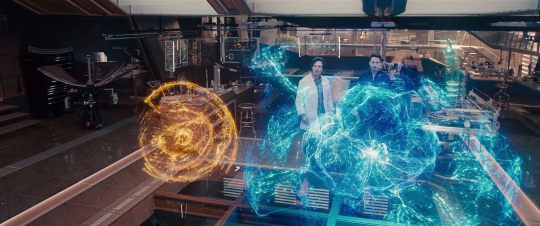
Does it pass the Bechdel Test?
Yes, once.
How many female characters (with names and lines) are there?
Seven (30.43% of cast).
How many male characters (with names and lines) are there?
Sixteen.
Positive Content Rating:
Three.
General Film Quality:
Significantly flawed, and well-known in fandom for it. Unpopular opinion? I still think it’s better than the first Avengers film.
MORE INFO (and potential spoilers) UNDER THE CUT:
Passing the Bechdel:
Natasha and Laura pass in a single-line trade. It’s sooo close to not counting.
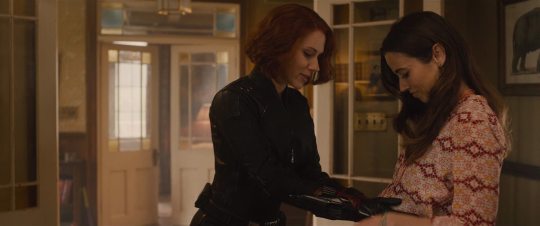
Female characters:
Natasha Romanoff.
Wanda Maximoff.
Maria Hill.
Helen Cho.
Peggy Carter.
Laura Barton.
FRIDAY.
Male characters:
Tony Stark.
Steve Rogers.
JARVIS.
Thor.
Clint Barton.
Strucker.
Pietro Maximoff.
Bruce Banner.
Ultron.
Sam Wilson.
James Rhodes.
Ulysses Klaue.
Heimdall.
Nick Fury.
Erik Selvig.
Vision.
OTHER NOTES:
Everyone talking about Strucker like we already know who he is...
The “Shit!”/”Language!” gag was funnier before they hung a lantern on it. Not least because it takes almost a full minute before Tony harks back to it (fifty seconds, actually. I checked). If you’re gonna make a Thing out of it, you gotta follow up immediately, not after fifty seconds of cutting around to different character intros and action shots and a whole lot of other dialogue.
Urrgghh, ok, I’m going to break my standing rule about not discussing source material, because we gotta acknowledge the colossal wrongness of re-writing the Maximoff twins - canonically Jewish Romani - as willing volunteers in a Nazi science experiment. It gets worse the more you think about it. There are a few things about this movie which generated significant negative outcry, and this incredibly offensive decision is one of them.
Tony and Thor fighting over who has a better girlfriend does have a certain charm to it. If you’re gonna have a testosterone-off, it might as well be about how great your partner is.
I got a zero out of ten on this out-of-nowhere forced romance crap with Natasha and Bruce. We’ll come back to this later.
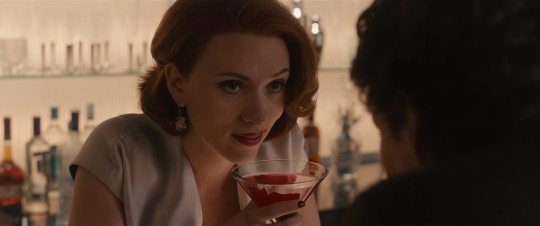
“I will be reinstituting Prima Nocta,” Tony declares, as he prepares to lift Thor’s hammer and thereby theoretically take charge of the Nine Realms. Primae noctis (believed to in fact be a myth) refers to a supposed Dark-Ages law that granted lords the ‘right’ to take the virginity of any newlywed peasant woman who lived on their land. So, this is a wonderful little rape joke from Tony (or, y’know, not so little, since primae noctis in reality would make Tony a serial rapist). Ha ha ha ha. Hilarious. Good one.
I’m really mad about the parts here that are total garbage, because mostly, the revels sequence has a nice low-key quality to it, good solid team dynamics.
I can’t fucking believe that they played the ‘and then Bruce falls with his face in Natasha’s cleavage!’ gag. I cannot believe it. Is this a disgusting frat-boy comedy from the nineties?
Honestly, Tony, just shut up and admit that you KNEW from the get-go that it was wrong to try and make Ultron happen (that is why you kept it secret from everyone else to begin with); don’t try to defend the decision now that you’ve got a ‘murderbot’ on your hands. Take responsibility for a bad choice instead of talking shit about how you had to and everyone else is just too short-sighted, damn it!
Andy Serkis is delightful.
The Iron Man/Hulk fight absolutely KILLS the momentum of this film. It goes for way the fuck too long (eight minutes) and has no narrative significance at all. Pro tip for action scenes: they should always be driving the story somewhere. You can pull off eighty minutes of action so long as your plot is advancing alongside/within it.
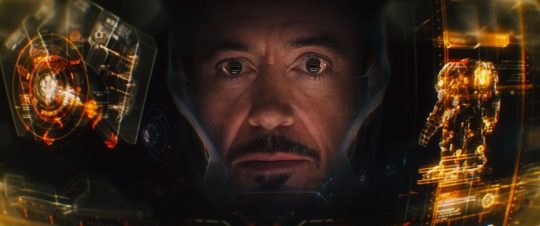
Also, Iron Man causes a huge amount of additional damage during this fight, in the service of the aforementioned pointless action. His efforts to minimise Hulk’s effects are extremely poor, and calling in his relief organisation to clean up after the fact does not negate that.
Gotta love that throwing a wife and kids at Hawkeye at the same time as we suddenly start pushing this Natasha/Bruce thing. That’s not transparent at all. I also understand this to be a major deviation from Clint’s identity in the comics, and very unpopular with fans for that reason, but regardless; reinventing him as a family man to reset the romantic blather after baiting fans with the possibility of Clint/Natasha in the first Avengers movie is such a shitty move. I was not invested in the ship myself and would have loved to have them reinforce the just-friends relationship between Hawkeye and Black Widow, because there are not enough platonic friendships between compatible men and women in fiction, but 'they’re not interested in each other because they’re busy with someone else!’ is a weak reinforcement indeed. Less forced romances, and definitely less token wifey who exists for no other Goddamn reason at all. This comes out of nowhere, and not in a clever-surprise kind of way.
“You still think you’re the only monster on the team?” Natasha says, after telling Bruce about her sterilisation. This earned a HUGE backlash, and for good reason - despite all arguments about how what Natasha meant was that her being raised to be an assassin makes her a monster, the direct implication of her words as they are phrased and as the discussion is structured is that her inability to have children makes her monstrous, and that’s deeply offensive. It’s also completely in keeping with a narrative which is often played out against women, in which their value as people is attributed directly to their ability to produce offspring, so it’s not even like this outrageous implication of monstrosity - the corruption of what it means to be female! - is that unusual. It’s awful, but not unusual. Add on the fact that 1) Natasha’s nightmare-flashes specifically foregrounded her sterilisation over all other details of her training, supporting the idea that she believes that it’s what makes her irredeemable (instead of, y’know, all the murdering and stuff), and 2) this is Joss Whedon’s work and he is OBSESSED with highlighting the womanhood of his female characters and treating it like their defining trait while also variously punishing them for it, and you’ve got every reason to interpret this terrible fucking line as exactly the heinous thing it (presumably, unwittingly) seems to be.
Steve ripping a log in half with his bare hands is the funniest thing in this whole movie.
Thor’s brief side-adventure with Erik Selvig is pretty out-of-place. He just...goes for a swim in a convenient magic pond that Selvig chances to know about. Seems normal.
Ultron is full of such boring, empty rhetoric. Reminds me of Loki in The Avengers, with all that sound-and-fury.
I love Paul Bettany.
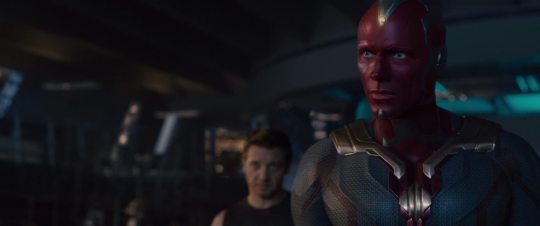
Man, they sure do find Natasha instantly. It’s almost like making a damsel-in-distress of her who needs to be rescued by the team was completely meaningless...
Breaking my no-BTS rule (since I already have done for this movie at this point) because it’s well-known how Joss Whedon ordered Elizabeth Olsen not to show exertion or ‘ugly emotion’ on her face in this film, because God forbid she compromise her attractiveness by being human. Joss Whedon is not human; he’s fucking trash.
The final fight sure does just, y’know, get to a point where it ends. They really did not ratchet up the tension over the course of the Sokovia conflict, it just goes along until it stops (also, they say Sokovia is a country, but then they never call the city anything else, it’s just Sokovia. Is the city conveniently named after the country (very confusing), or is it a city-country, like The Vatican? I kinda assume it’s option three, which is that no one bothered to care because it’s just some fake European placeholder anyway and we’re not supposed to notice such a dumb oversight).
“I was born yesterday.” This is the best quip in this whole thinks-it-is-way-wittier-than-it-is movie.
Helen Cho deserved better than to be a prop rapidly dismissed and then just trotted past at the end for an ‘oh, she survived, btw’.
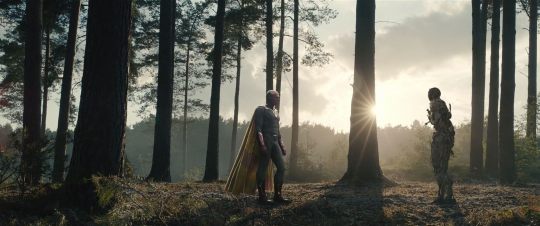
Back when I reviewed the first Avengers movie, I said that I considered that film to be heavily overrated, so maybe it’s not such a surprise that I actually like this one better. The two primary problems I had with that first film were the overly simplistic plot, and the fact that most of the characters were OOC compared to previous films, and this movie does do better on both scores, so I feel more engaged by it, and less annoyed. That said...this movie has still got a lot of problems, and those include iffy characterisation and a plot with various holes, nonsensical complications, and conveniently ignored or smoothed-down dynamics. When I say I like this movie better than the first one, I mean just that: I like this better. That does not mean I am here to sing its praises.
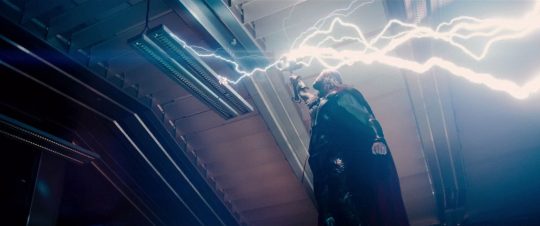
The tacked-on romance is part of the problem - for Clint as well as Natasha (but especially for Natasha). After Hawkeye was so heavily under-used in the first film (and his slightly-ambiguous relationship with Black Widow was the only human element that made him a character instead of a prop), Age of Ultron attempts to compensate by giving Clint a personal life, in the form of a magically-appearing heavily-pregnant wife and a pair of nameless children. The function of this family appears to be 1) to give Clint a reason to not be interested in Natasha, and 2) to ‘humanise’ him by giving him something to fight for and get home to, because we all know nothing legitimises a character quite like some otherwise-irrelevant dependents. Want a man to seem lovable and important? Give him a pregnant wife. That’s what women are for, anyway, right? To enhance a man’s story? In this case, to provide a man whose purpose in the story has been contested with insta-personality, because ‘he’s secretly a family man, ooh, twist!’ is way better than having to spend time on giving him something to do in the plot that is actually meaningful in some way. Great logic. Makes Hawkeye super dynamic, right?
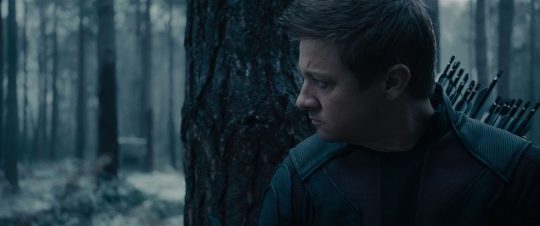
Natasha, unsurprisingly, is hit much, much harder. As the only female avenger and one of only two prominent female characters in a cast which has seven-to-nine male characters of equal or greater importance/screen time (YMMV on whether or not you think Fury and Vision count for that list), the pressure is already on for Natasha to be served up a quality narrative, because if she doesn’t get one, well...she doesn’t have six-to-eight alternative characters to pull the weight for her gender. The best solve for this problem would be to avoid the ‘Token Woman’ cliche in the first place, but since we missed that boat...not having the personal story of your only primary female character revolve completely around her womanhood and her catering to heteronormative expectations of a love interest would have been a good choice. This weird, forced, chemistry-free thing with Bruce Banner? Was the worst thing they could have used to define Natasha’s presence in the film. It sticks out like a sore thumb every time they have an awkward interaction, and it leads in to that atrocious ‘monstrous infertility’ element (though that particular egregious mistake could have been included with or without a romantic blunder, it...probably wouldn’t be, and we’d all be the better off). Even the Hulk-whisperer part of the relationship - while not awful on its own with all the unnecessary romance and Unresolved Sexual Not-Tension removed - serves to highlight Natasha’s female-ness by making her the soft maternal figure for the team, because God forbid one of the other male members of the team be asked to ASMR-speak to the Hulk while delicately caressing his hand. If Natasha’s presence in the first Avengers film leaned too heavily on her gender identity as a defining trait (and it did), this movie doesn’t fix that problem at all: it doubles down on it.
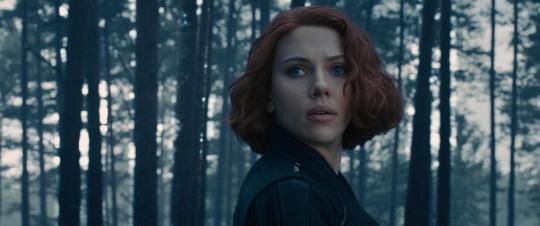
The good news for most of the excess of male characters is, they by-and-large don’t feel as OOC as they did in the first film. The boorish romantic entanglement aside, Bruce Banner is still a naturalistic character highlight (all credit to Mark Ruffalo, who probably doesn’t know how to turn in a bad performance in the first place), and Thor’s dialogue is way less ridiculous this time ‘round, so he lands a lot closer to his personality from previous films simply by virtue of sounding like the same guy (unfortunately, the plot does not have the faintest idea what it wants to do with him as a character). Steve Rogers is still being written as if being Captain America is his character, which is a fundamental misunderstanding of his identity, albeit one which conveniently allows him to behave in a stereotypical self-righteously bland manner, thus avoiding the need for any nuance in his perspective or actions. This borderline fanfic-flamer ‘Captain America is my least favourite character so I’m going to write him as a boring stick-in-the-mud and then hopefully no one else will like him either!’ approach doesn’t grate quite as badly as it did in the first Avengers, and it can’t cancel out the innate level-headed charm of Chris Evans, so as disappointing as the bias is, it’s still a better balance here than it was last time. The one character who is not so flatteringly handled, however? Also happens to be the one who was arguably handled best last time, and unfortunately, he’s the one who is essentially treated as the ‘lead’.
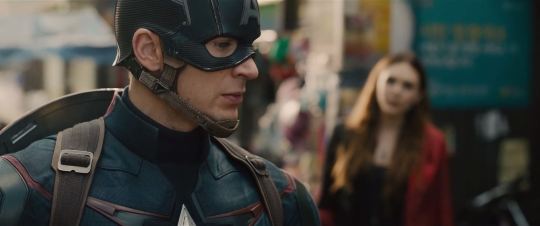
The big problem for Tony Stark is that this movie is not interested in digging in to the pathos of any character, it’s all-flash-no-substance on that front, and Tony really, really needed a less heavy-handed slathering of ‘afraid of what might come (feat. messiah complex)’ to motivate his actions and reactions in this film, because without any exploration he’s basically just a billionaire kid playing with matches. If this were an Iron Man film (either the first or third one, anyway), we’d get into some tasty deconstruction of Tony’s mental state and confront his hubris, etc, and - crucially, most crucial of all, it’s a mainstay of all his past stories in the MCU - Tony would own up to his mistakes, listen to the advice of those around him, and take contrite steps toward fixing the problem not just in the direct sense of ‘beating the bad guy’, but also in the personal and emotional sense of working on his own flaws and making amends with the people he hurt along the way. This movie offers none of that. To begin with, Tony’s ‘I know best and I will not be taking any questions’ approach to creating Ultron feels like a significant step backwards in his character development so far (Iron Man 3 was specifically about addressing his PTSD and associated tumultuous emotions surrounding the fear of imminent alien invasion, so his reactionary and secretive behaviour in this film feels particularly out-of-touch with a mental reality Tony has been explicitly working on for the past couple of years); Tony is actively aware that it’s a bad call and thus hides it from the other Avengers until it’s too late, and then he’s bizarrely unrepentant about his mistake. Worst of all, he actually attempts to repeat that mistake, only worse, late in the film (the fact that his idiotic ‘mad scientist’ pep talk actually convinces Bruce to help him again is the weakest character moment for Bruce outside of the aforementioned romance crap). The plot rewards Tony’s second, far worse mistake, in the creation of Vision, who turns out to be ‘worthy of wielding Thor’s Hammer’ and whatnot and conveniently provides every necessary skill to defeat Ultron in a deus ex machina so overt you could use it as a textbook example, so even though Tony had absolutely no way of knowing that he’d get a good result this time and almost every reason to believe he’d just compound the existing problem, his reckless disregard for the literal safety of the planet is treated like a good thing because it happens to work out this time, and they just kinda sweep under the rug the fact that Tony is playing God (and being uncharacteristically stupid and selfish about it - in other films, Tony is normally only reckless with his own safety, and it’s when his actions spill out into unintended consequences for others that he realises the error of his ways and cues up a positive learning curve; it’s what makes him palatable). At the end of the film, once Ultron is gone and Tony has thrown some dispassionate wads of cash into ‘relief efforts’, he strolls and quips and eventually drives off into the sunset in his expensive car, with nary a mention of, I dunno, maybe a little guilty conscience? Maybe a hint of having learned a valuable lesson? The closest he gets is just suggesting that it might be time he retires from Avenging, but neither he nor anyone else lets on that there’s a need for serious self-reflection. The Tony Stark in this movie is the nightmarish male-fantasy version of the character, the playboy with the cool tech and no limits who does whatever he wants and then...literally rides off into the sunset in the end, no muss, no fuss. He’s kinda like a complete reversion to his original self, pre-Iron Man, frittering money around and designing weapons of mass destruction while convincing himself he’s bringing peace to the world one explosion at a time, but that Tony has no business here, seven years of character development down the track.
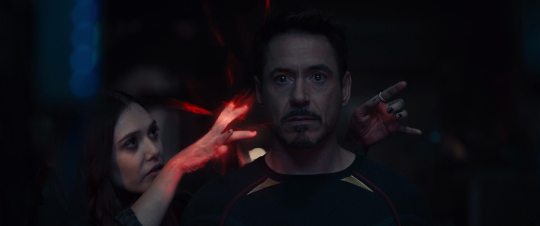
While we’re talking iffy characterisation, we should also segue into plot, and that’s something we can do easily enough by looking at our villain, Ultron. Calling Ultron an actual character feels...ambitious. He’s a CGI robot full of empty rhetoric and, you guessed it, more of those quips that this movie has in place of any meaningful dialogue. I’d call him self-fellating, but he ain’t got nothing to fellate, so instead he just blathers a lot in a manner that sounds vaguely poetically intelligent but is, upon a moment’s consideration, just vapid nonsense (much like Loki in the first Avengers, as noted above, but at least Loki had the benefit of a flesh-and-blood actor delivering his lines with conviction; James Spader does solid work as the voice of Ultron, but trying to make a CGI robot who spouts a school-kid’s attempt at edgy philosophy sound like a genuine menace is an uphill battle). Speaking of genuine menace, I assume the reason the film is called Age of Ultron is because A Couple of Days of Ultron Causing Disturbances in a Handful of Specific Locations was too much. For all the big talk (and there is..so much), Ultron doesn’t get up to all that much trouble, most notably in the sense that he apparently has his code all over the internet and yet he doesn’t bother stirring up a single ounce of chaos with that ungodly power. Why bother including this as an element of the character if it achieves zero story? Is it purely to make Ultron seem ~unstoppable~ because he keeps downloading into new robots? Because it didn’t really land, y’all. They try to play it like a big victory for the good guys when Vision burns Ultron out of the ‘net, but in context it’s meaningless because he didn’t do anything while he was there. Pretty much everything about Ultron was all talk, little to no action - even a whole bunch of the trouble he did cause happened off-screen, with Maria Hill just popping in to let us know that ‘there are reports of metal men stealing shit’. Cheers, cool. And you know, Ultron makes a song and dance about how he’s going to save the world by ‘ending the Avengers’, but then he...does not pursue that at all. He tries to make himself a pretty body, the Avengers thwart him, and then he enacts a doomsday machine to destroy all life on Earth. Like every other aspect of the character, the whole ‘end the Avengers’ schtick is just white noise, there’s no meaning in it. Ultron is just a same-old-same ‘What if Artificial Intelligence wants to WIPE US OUT?!’ cliche, and maybe that’s what he was in the comics too, I don’t know, but it’s the job of the film to tell that story in a dynamic way, and they had two and a half hours to do it. And yet.
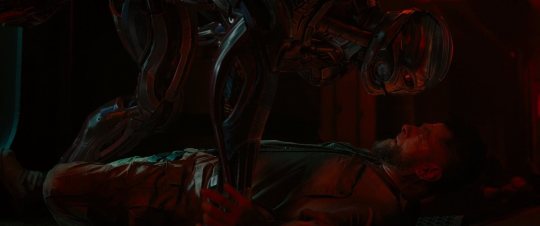
There should be more to this than a nondescript placeholder villain concept and a series of action set pieces that just kinda happen until they stop. At least the first Avengers had some variety in each of its action sequences, using the location and the different skills and weapons of its antagonists, whereas this one is just ‘there are robots and the good guys punched and shot them until they were all broken, the end’. Even making the city fly in the end doesn’t actually make it interesting, not least because the characters spend most of their time running around the (weirdly, perfectly stable) streets not having to deal with any consequences of being up in the air anyway, and the doomsday device is too nebulous to ratchet up any real tension about figuring out how to deal with it. The conflicts with the Maximoff twins have at least some spark of life in them, but the characters themselves are treated to an over-simplified and very contrived narrative arc that uses what they do and what they know more as plot devices than as details of actual people’s lives, leading to a cheap death for Pietro so that Wanda will be distracted enough to abandon the big ol’ doomsday button, and it’s just all so convenient. There’s no heart in any of it, and it makes the moments that try to have heart all the more embarrassing and out-of-place (don’t even get me started on what a prescribed attempt at tugging the heart-strings it is to have Hawkeye name his magnificently well-timed newborn after Pietro, because DAMN). When I said I liked this movie better than the first Avengers, I meant just that: I like this better. That’s not to suggest that it is significantly better in any sense, because it isn’t, and I can’t even argue that this one has a better story, because honestly, it doesn’t. The first film made more sense, it was just less interesting to watch, and the things about it that were contrived were contrived in different ways. The first film was weaker and more irritating on character, and character is always the most important part of a story for me, so as annoyed as I am by the major character blunders in Age of Ultron, I’m still not as annoyed as I was after The Avengers. That is damning with the faintest of praise; this is just not a particularly good movie, it makes a poor use of its cast at the best of times, delivers a sub-par action extravaganza, and the script is not half as witty as it gleefully convinces itself that it is. It comes as no surprise, I’m sure, that I am very glad a certain writer/director departed the franchise after disappointing everyone with this outing. I say I like this better than the first Avengers, but gee, it’s a close call.
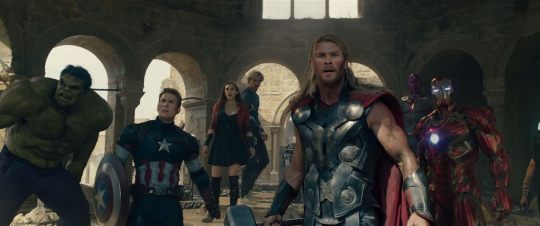
#Avengers: Age of Ultron#Marvel Cinematic Universe#Bechdel Test#female representation#MCU#Age of Ultron#Avengers
31 notes
·
View notes
Text
ESSAY on the ‘’sexually queer female gaze’’ for referance
BY AMY KEANE
‘’Taking a range of photographic images or a single photographer’s work, discuss how the gaze is addressed through issues of Gender. From your research define your understanding of the gaze’’
The gendered Gaze, brought to the forefront of the medias attention by Laura Mulvey in her essay published in 1975 ‘’ Visual Pleasure and Narrative Cinema’’. The ‘’male gaze’’ represents the portrayal of women in media, to be objectified and sexualised, as heterosexual men are prominently in control of the camera. Referencing to both voyeurism and Freud’s theory of scopophilia, Mulvey coined the term to produce the ‘’female gaze’’ to then represent the gaze from and for the heterosexual female viewer. Gender is dominantly used in the male gaze, assuming that the males in control of producing the media based content, are heterosexual and are therefore sexually and/or romantically attracted to the female subjects. From this their judgement and ability to produce un-biased content is non existent. In this essay I will further explore the gaze’s and their relation to gender but also question the theory of what gaze the sexually queer female would have,sharing their natural sexual and/or romantic attraction to women and the female body. Wether this makes them exempt to the male gaze as identifying as female. Further questioning if the obvious exploitation of women in media, and the common knowledge of this oppression to all women, overpowers the fact that sexually queer females could also only posses the power to sexualise and objectify the female body?
Freud in ‘’ Three essays on sexuality’’ looks at scopophilia. The theory that ‘’ looking itself is a source of pleasure, just as , in the reverse formation, there is pleasure in being looked at’’. In Freud’s research he linked this widely to’’taking other people as objects,subjecting them to a controlling and curious gaze’’ This information seems critical to Mulvey’s work regarding the gaze as a basis of where the nature of objectification comes from. To take this theory and understand that it can be somewhat pleasurable to condemn a subject to objectification is a flaw to Mulvey’s work that of focusing clearly on the heterosexual view of this. Looking at the apparent bigger picture should it not be classed as a contribution to the gaze but with the inclination of not being specifically gendered. As being a form of fetish that can be used by any gender as well as being able to be projected onto anyone of any gender.
A generic male gaze has been papable with the historically obvious patriarchy system in which still dominates the art world. The male gaze can been seen in works as early as 1538. Titian’s ‘’Venus of Urbino’’ is a painting of a woman in nude, lounging on a bed of expensive fabrics. One of her hands placed on her upper thigh covering herself and the other dropping a handful of flowers. The models head is tilted to the side with a controlled expression. The image posses a visual showcase of the male gaze, being a calculation of everything in which would be sexually appealing to a heterosexual male in context to the time produced. The female being nude, in which was considered to be a lot more promiscuous at the time, not having the prominent exposure to nudity that is classed as neutral in the twenty first century, is an obvious compliment to the ‘’peeping toms’’ and ‘’ obsessive voyeurs’’ ‘’ whose only sexual satisfaction can come from watching an objectified other’’. From the passive expression and pose to the models surroundings the woman is in the image simple to be looked at. Comprehending the surroundings of fabric and flowers you could say that the woman is placed and organised into position just as a still life of fruit would be composed. To be looked at, objectifying her for nothing more than her body. Submitting to a quote found in Mulvey’s writings by Budd Boelticher ‘’What counts is what the heroine provokes, or rather what she represents. She is the one , or rather the love of fear she inspires in the hero, or else the concern he feels for her. Who makes him act the way he does. In herself the woman has not the slightest importance’’. Referencing that to the role of the heroine is the everyday woman and the ‘’Hero’’ is the everyday man. As an example in Titian’s image the role of the woman is to get a reaction from the male viewer. It is the idea in which the woman inspires with her appearance and pose rather than her intelligence or through a visual role of actual significance. This is easily communicated into modern day photographic advertising with women unnecessarily over-sexualised in order to capture the attention of the forever dominant heterosexual male audience for purposes of sales.
Annie Leibovitz is an American portrait photographer, with her work being projected world wide. Photographing for publications such as the Rolling Stone and Vanity Fair, Leibovitz portrayal of her subjects and models have a monumental affect globally for representation of said person. Overall holding a responsibility as a photographer to capture a positively un-bias viewing platform for the audience. Leibovitz is an openly sexually queer woman who often produced work with her late partner Susan Sontag for example a book called ‘’Women’’ photographs by herself and writings by Sontag. One of Leibovitz’s more famous shots is one of Demi Moore on a cover for Vanity Fair. The model was shot nude, the image itself has the subjects body profile cradling her pregnant stomach and covering her breasts with the other hand. Moore is looking away from the camera with a calm and strong expression. The image exudes with a comfortable confidence. It posses the power for the viewer to see and acknowledge the actress, the soon to be mother, the person present in the photograph. Creating the exact opposite to the male created ‘’Venus of Urbino’’ where all is acknowledged is the female form in a sexualised setting. Both images contain women as well as both images being nude pieces yet the process of expression differs being composed by different genders. Mulvey would point this to be a representation of the male and female gazes. The male gaze prominent in the ‘’ Venus of Urbino’’ as it was composed by a man with ideologies of being seen by men. Whereas Leibovitz’s shot this as a female, with the female gaze for the female audience. The argument now starts wether or not Leibovitz can truly shoot such images without the presence of the male gaze being included with her work considering her non-heterosexual sexuality and attraction to women. The question is as poses how could someone whose is sexually and romantically interested in women, especially in a nude based shoot, not over sexualise or objectify said model?. In the book ‘’Women on women’’ accurately coinciding with the title of being women photographers shooting women models, Sacha comments ‘’ Man always sees a showcase, a shop window, the way a woman shows herself to the outside world. A man can look at it, but not be in it- thats the difference’’. In this comment she is referring to the differences between the two gender gazes. Promoting the theory that as a woman, Leibovitz can find the distinction between women being sexual beings:when posing in erotic or non-erotic ways, with or without clothing as well as including sexual inclinations or not and alternatively women being showed as sexual objects. Mario Sorrenti, a heterosexual male, photographs what in the present day is not a shock or abnormality; the world of media bending to suit the heterosexual male and his desires. Sorrenti’s work is popular in the genre of advertising, in particular his work with model Kate Moss for the Calvin Klein men’s perfume Obsession. The sole purpose for the advertisement is to sell the product being perfume, yet the only content in Sorrenti’s image is a naked Kate Moss. An advertisement main goal is to attract its prime target audience with aesthetically grasping imagery to associate the product or brand to, furthermore increasing sales. The male gaze is at its most pronounced in this situation of literally using the woman and her body as an object of sexualisation for sales. Contrasting to Leibovitz’s image of Demi Moore, of which was used as a cover for the sale of a magazine. It puts into perspective if the same model was shot by a heterosexual male, like Sorrenti, and following the theory that sex is a large contributor for sales; would the new image of Demi Moore contribute to the sales of the specific magazine? This is only questioned with the idea that the male gaze is overbearing and not only affects the women oppressed by the gaze but the women that are influenced by this ‘’norm’’ that is in modern day culture. Because women have been so heavily exposed to such imagery subject to the male’s desires, could this also demonstrate a brainwashing of women to think that this representation of women is normal, positive or even influential? As to be the subject of the male gaze is what a male would describe to be desirable. The short answer would be Yes. Shown with the growing market of diets, beauty products and cosmetic surgery advertised to gain the ‘ perfect’ look/image. With this many examples of the ‘perfect’ image would also be a direct representation of what the heterosexual male conceives as attractive in a woman. The male gaze directs this idea in the twenty first century being a great deal more obvious than the critic of male appearance. Photography is a direct catalogue of this information especially within in the advertisement industry. Cases of this can be found in the clothing company American Apparel in which has had many advertisements banned in the UK due to their explicit nature involving women and their bodies. Particularly I am drawn to this series of photographs and text that purpose is to sell pairs of socks. Everything about the image screams that it has been raped by the male gaze. The main image consists of a woman in a submissive pose gripping her knees up to her chest, being the only thing apart from her hair loosely covering her breasts. The camera angle depicts the viewer to be looking down and aggressively onto the model. The expression of the subject being blank staring back up to the viewer with a somewhat fetishised ‘’ innocent ‘’ appearance. The set of three images to the left of the composition see the model mid chest to forehead laying down on sheets pulling prominent facial expressions widely associated with pleasure from performed sexual acts. The main text on the image states ‘’ Safe to say, she loves her socks’’. The comment is to that of a sarcastic remark referring to the viewer stereotypically looking at everything but the socks in the image due to the extreme sexualisation of the model. Finally with more text at the bottom right of the composition stating ‘’ Meet Lauren Pheonix. 150lbs of magic. Actress. Director. Look her up on Google’’. Firstly the mention of her weight is also completely irrelevant to the purpose of selling socks and only to a means of objectifying the woman to her physical stats. A small amount of ‘’Google’’ research puts forward the information that the model has a career in the pornography industry. Observing the image and the model disregarding this irrelevant information pointing to exploit the career she chooses to earn money only brings to mind one thought. Why is it necessary for a porn star to assist in the sales of socks? Even in perspective that the model, for her appearance alone suited the casting for what is suitable for American Apparels sock model, it has been made a statement with the text included that the brand wants to associate itself with what is a taboo subject, with sex. ‘’ Look her up on Google’’. This image is a prime example of photography that is used for the male gaze. It is the representation of the unnecessary objectification of women in advertising to please the most common viewer, being the heterosexual male. For an audience this promotes sexism and a divide between genders the male gaze in this instance is a promotion for this sexism that women and their bodies are to be used for any means like advertisement or sales. Looking at the works of Zanele Muholi, specifically indulging in her ongoing project ‘’Faces and Phases’’ showing photography of the community in which she is a part of being LGBTQI. Zanele Muholi has known not to be shy with her subjects of which have been photographed. Some of her work for example ‘’Being scene’’ depicting blurry video footage of bodies, lesbian couples including herself and her long term girlfriend being intimate. The representation in the photographs is important here being some of a small world wide collection of a sexually queer woman photographing sexually queer women. With my evaluation of Muholi’s images I have come to the conclusion that the images must posses both gender gazes or neither. Potentially collecting the alternative term as the Queer gaze? Defining as the depiction of women through the gaze of a queer photographer. Because of the photographers sexual preference in conjunction with the subject it could be advanced that the photographer has the potential gaze in which that would have be neutral? In comparison to David Hamilton’s representation of queer women in the book ‘’sisters’’ Muholi’s work can be analysed to be a honest depiction of the subject whereas Hamilton’s to be a exhibition of what he thinks queer women should be portrayed as. It could be argued with the obvious exploitation of queer women in media, especially in pornography, that Hamilton’s gaze is a explicit statement of the male gaze. Hamilton being male and queer women being sexualised more so than the stereotypically average heterosexual woman wether that be because of the fetish of the straight male only being able to use his gaze to look on the queer woman and not being able to posses her. Or due to the fact that there is a stereotype that makes queer women, especially their sex lives, to be that of a performance to please the straight man. This can be evident again ,as a second interpretation, of the quote by Sasha stating ‘’Man always sees a showcase, a shop window, the way a woman shows herself to the outside world. A man can look at it, but not be in it- thats the difference’’. The sexually queer female from my research does hold the ability to sexualise and objectify women. With the sexually queer photographers I have looked into it has been evident in their work that their knowledge and perhaps the personal accounts of sexism and oppression of gender sported from men and their gaze educates the queer woman not to do onto others what is done on to herself. Acknowledging that women can be sexual beings without being sexual objects. Identifying with their female gender first before their sexuality. With the knowledge of there being more than two genders and a spectrum of sexualities, including but not exclusive to heterosexuality, my research on the gaze has been refined to that the term needs to reassessed. An idea for this would be to look at the gaze not referred directly to gender or sexuality. But as a view that being a person whom does not identify with the same as your subject your ‘’ gaze’’ will still be evident on them, wether recored in a media form or not. IT will not be a true representation of that person. Although gender is relevant to the heterosexual male gaze for its history in photography dividing prominently females and males in a battle of equality between the sexes. Feminism, Equality for all, is a constant battle in the twentieth first century specifically in media pushing for representation of camera operators, editors, directors, producers etc of a multitude of genders and sexualities to find a balance of the gaze’s and a fair and equal representation of all current minorities. To achieve this would effectively almost execute the idea of objectification.
7 notes
·
View notes
Text
Thoughts Roundup - Twin Peaks: The Return, Part 14
“We Are Like the Dreamer”

David Lynch famously said that he can’t stand people talking after they see a movie. That the movie is the talking. Despite the fact that talking about movies is pretty much my passion, I get what he means. Up until recently, i’d be scouring the internet for hours after each new episode, reading about every talking point, every theory and attempting to unpick every moment. I would do this immediately after watching each episode which, really, makes no sense. Yes, I still like to read reviews and give the forums a quick peruse, but I find that to get the most out of the show, I have to sit with the episode for a while, and see how I feel about it after a good night’s sleep, hence why I write these reviews a day after I see each episode. There is such a thing as too much and too soon, and reading pieces immediately after watching an episode is sort of like seeing the opening act after you see the main show. There is so much to take in and enjoy with each given episode that afterwards I just need to process it in my own way without getting external input.
Talking and writing about the show does have merit and is great fun, I just am starting to realise that I need to separate the show from the writing about the show. I mean, how can it not mess with your expectations, for better or for worse? “We WILL see X character next episode”, “The next episode will be the ONE where everything changes”, “This character from this episode will be the key to the whole mystery”, and so on. How would I feel about The Return if i’d never read a word on it? Part of me wishes I had, but then again good, thoughtful writing about The Return is so complimentary to my enjoyment of the show, and has made me appreciate so much more about it. I suppose my point is: writing, whether good or bad, has affected the way I watch and view the show, and so for the reviews henceforward, I will try and keep my points as individual and unaffected by other writing as possible. Ideally, i’d like what I say about the show to express how I feel, rather than attempt to sway the readers (all 2 of you) a certain way. So, after a good night’s sleep, little to no reading on the episode and a big, fuck-off coffee, let’s talk about...
. The FBI. The episode kicks off and wastes no time in getting straight into things. It’s with openings like these - abrupt and un-establishing - that remind you that this is from one long, 18-hour Script. The endings often remind me of this fact too. Absent are cliff-hangers and buttons, and absent are ‘previously on’s at the beginning of each episode. Instead, here’s Gordon, calling Lucy. It’s strange to think that they haven’t interacted in The Return yet, and even stranger to remember that Gordon hasn’t even been back in town. It’s strange, because they’re two of the funniest characters in the show, and Gordon is one of the most Twin Peaks-y characters, despite not even being from the town. They feel linked, even if it’s by one event 25 years ago, and they are still linked today - they just don’t quite know how, yet. Gordon’s call to Lucy is laugh out loud funny; I have a simple comedy brain, and will always laugh at things that are too loud. Hearing Gordon’s tinny yell pummel its way out the end of her receiver really tickled me, as did his unexplained, confused pause when Lucy told him of her trip to Bora Bora. Not a beach boy, Gordon? So, for a scene that wastes no time, it certainly wastes time, but beautifully so. Their interaction is a miniature reunion that finally links Gordon back to Twin Peaks, which has always felt like his spiritual home.
The Return has had a really interesting way of dispensing information, wherein waiting for a character to discover something that we already know is as gripping as us discovering information in the first place. And so, Gordon finally finds out about Laura Palmer’s missing pages, and how it indicates “Two Coopers”. You have to admire Robert Forster’s straight-face matter-of-factness in handling these topics. He knows it sounds strange, but to him, these are just strange truths that it is his duty to notify his colleagues and superiors of. I guess, as a Bookhouse Boy, Frank Truman has seen enough odd things in those woods to not be particularly fazed by them anymore.
. Tammy, God Bless you for saying “What’s the significance of the Blue Rose?” when asked by Albert which one question she should ask him about the first ever Blue Rose case. That is what we all want to know, and the last few episodes have given us more clarification of that than I ever expected. She could be seen as an audience surrogate, the newbie to whom everything is explained. But she is also smart, more proactive than the typical rookie, and she gives us the most perfect explanation of what a Blue Rose is: something which does not occur in nature. It’s exciting getting to hear glimpses into the history of the Blue Rose, but a bigger bombshell is dropped in this scene, one so inextricably connected to Dougie and Vegas that it’ll most likely have our FBI crew strolling down the strip by the next episode: Diane is Janey-E’s half sister. But, is she really? Whomever she is texting (which it seems is Doppelcoop), she tells them where the FBI are and that she’s getting them to Vegas. If this were her task, to get the FBI to Vegas, would it not be beneficial to her to speed up the process by claiming that she’s Janey-E’s sister? Who knows. Diane plays her cards very close to her chest, emotionally and informationally, and any time we get too close, we get a big fat Fuck You from her. For now, i’ll take her word for it, because I love the idea that Laura Dern and Naomi Watts are sisters.
. Monica Belluci has the secrets to the universe, or at least in Gordon’s head. “Who is the dreamer?”. It’s a damn good question, and I think what it means is “whose chess board are they all pawns on?”. Is it Doppelcoop, or is it forces larger than him? Is it “Mother”, or something we saw born in the atomic explosion? The show has always felt like a dream, and while I don’t believe it’ll all turn out to be a literal dream, the feeling is there, and it makes us wonder what version of reality we are seeing. It’s a thoughtful philosophical quandary, and one that clearly disturbs poor old Gordon, the sensitive soul. And next we have our Bowie cameo which is not really a cameo like the clickbait headlines tell us, but a scene from Fire Walk With Me, which, at this point, you almost have to have seen to fully appreciate The Return. It’s interesting that both Gordon and Albert hadn’t remembered exactly what Jeffries had said, and his “Who do you think that is there?” question regarding Cooper is certainly creepy in retrospect. Did Jeffries slip in and out of time, and see who Cooper would become? It feels like he is, if not a key to unlocking the mystery, at least a very important figure in the overall story. I don’t think there is a clear mystery that will ever be solved at this stage, and I think in a sense, it would be disappointing if there was one overall answer to everything. It would be too easy. Instead, lets just take each scene and surprise we get, try and contextualise them as best we can, and figure out what they say rather than what they literally mean. It’s too vague and too abstract for everything to be neatly explained, and really, wouldn’t that ruin some of the fun?
. The boy scouts Bookhouse Boys are heading to Jackrabbit’s palace, and there is something intrinsically melancholy about their journey, because it makes Bobby fondly recall his father. The woods they walk through aren’t the scary, foreboding woods we see in Twin Peaks at night, they’re glowing with sunlight and the home of happier times in Bobby’s childhood. That is, until they find a vortex to the Black and White World and the woman from the Purple World who helped Cooper escape back in Part 3, naked and unable to speak, and with skin still over her eyes. The scene of them exploring gave me serious Lost flashbacks, and like Lost, what comes next is confusing as all hell, yet fairly answerable.........I think. Andy, of all people, disappears to the Black and White Room, which looks absolutely stunning again. The set design throughout The Return has been terrific but perhaps a bit more modern and less stylised than some of Lynch’s other projects, but the Black and White room is a hit of that old school, Eraserhead style set design. The Giant names himself as the “Fireman”, which ties again to fire and electricity being a source of evil, and the Fireman as a pretty decent bloke, really. A window above Andy transforms into a cinema screen which gives him the weirdest “Previously on” the world has ever seen. From the Atomic Blast and the releasing of Bob into our world, to Laura Palmer being taken by the Angels, it is a stirring and haunting mirror into the darkness that summarises succinctly the nature of good and bad in the show’s universe. And now Andy - yes, Andy - has the secret to it all. It’s a hypnotic scene, and i’m increasingly blown away by how well The Return is blending the more abstract, with the linear narrative, to the point where the two cannot exist without each other. Like a blend of a wanderlust through the netherworld, and a real-world sense of purpose and duty, Andy takes the woman to the police station to protect her. He knows more now, and understands that she is in danger. From who? Mother, it seems, is still hot on her tail. His job has never been more important, and keeping her safe was as important as arresting the policeman earlier, a funny scene, the buildup to which seems to have played out almost entirely offscreen. I like it though - it reminds you there’s an entire world going on that you don’t necessarily get to see. The woman chirps and squeaks in her cell, desperately trying to articulate some sort of message. We cannot decipher her message, no matter how hard she tries to speak. So close, yet so far away.
. James has his first non-singing dialogue of the season, and though he doesn’t give too many glimpses into his life, we know that it’s his birthday, and that he’s a security guard at the Great Northern. And that above all, he seems happy. It’s hard to tell from what we see of him, but he smiles so much more easily than he used to, and his brooding seems absent. We’re not really thinking about ol’ forehead, because we’re thinking about his Security Guard buddy, a ‘cockney’ (that accent is maybe the scariest thing in the return yet) who has lots of lines to tell you that he is, in fact, English (Pubs? Check! Football? Check! Antiquated cockney rhyming slang? Check!). It’s weird and a bit goofy, but damn is it a story that hooks you. I love the idea that there are portals to the Other Places all over the world (the book hints that there are many), including in an alley in the East End of London. Does that mean Ian Beale is to discover one next? It’s such an incongruous image but kind of brilliant, and now we have someone sent specifically to Twin Peaks by The Fireman and given one very powerful hand. Arms and hands, man. The references to arms and hands being signs of power, possession, weakness and evil are so numerous, but they seem to be perhaps an entry point for non-human spirits? Then, James goes to check out a creepy noise (never a good idea you dumdum) in the basement of the Great Northern, where that odd ringing noise seems to emit from. It feels like he could die down there; it feels like he is dead down there. It feels like hell, and there’s more excellent set and sound design to thank for that. There is something very bad under every building in Twin Peaks...
. In an episode that has so many talking points to choose from, I think the one that most people will be talking about is Sarah Palmer’s. Her scene is so filled with dread, malice, then satisfyingly gruesome terror that I needed to pause the episode afterwards. It’s an horrific yet celebratory moment: the disgusting harasser gets exactly what we’ve been waiting for the whole series, and gives a sense of power and authority right back in the hands of a tortured woman. Yet, it is pretty clear cut evidence that Sarah is either not a person, or is a person who is, for want of a better word, darksided. Was she the girl who got a bug in the mouth after all? Is she home to spirits as Leland was? It’s hard to tell, but i’m all for the spirits if they cause her to bite a gross dude’s throats out. When Laura took her face...off at the beginning of the Return, there was nothing but light. When her mother did the same, a darkness peered out, as did a cheshire cat grin that takes a pretty high place on the Nightmare Imagery Shitlist of The Return.
. And we come to an end, with more ambiguous discussions at the Roadhouse. Billy gets a mention, and it is likely that he was the blood soaked creep from the jail cell scene earlier in the episode. “I can’t remember whether my uncle was there”, says one of the characters as she describes when she last saw Billy. She seems worried by this. It’s such a small and seemingly unimportant question, but it feels like the detail that makes her story not of this world. Having characters in more than one place at a time and having characters disappear and reappear has made us look out for any variation on this theme, and the Uncle’s both being there and not being there stands out. The talk of family members reminds me of the screaming car woman with the sick teenager from episodes back, who also listed members of her family, seemingly at random. What is going on in the families of this town? It feels so fucking nightmarish, and while I once didn’t enjoy these moments for their lack of direct connection to the narrative, I now appreciate them as miniature dramas, always unfolding under a shade of darkness, and expanding the universe of the show that you don’t really see. Tonight’s scene ties their drama to Audrey’s through the mention of Tina. How it’ll come together is to be seen, but the word I think most apt to describe it is Purgatory. It feels like these characters are stuck in a strange, haunted, endlessly unfolding narrative. Of abusive family members, of violence, lies and deceit, of nightmarish uncertainty and endless repetition. What would be really interesting would be to piece all these moments together to see what themes and motifs stand out, because like so much else, it feels like there is something pounding at us from beneath its surface.
That’s how I’d describe this episode. There is something underneath this episode, like the face beneath Sarah’s, or the language beneath the Blind Woman’s chirps, or the ringing sound underneath the Great Northern, that we get glimpses at but ultimately cannot decipher. They are brought out by fear, anger, necessity and desperation, and try as we all might, we may not discover what they all mean. Maybe it’s that we listen to the blind woman’s noises, that we venture into the basement, that we look into Sarah Palmer’s eyes, that is important. Perhaps the act of Andy listening to the fireman and watching those scenes unfold is what the purpose is. What matters most is not that the mystery is answered, but that we behold the mystery, and celebrate it. Isn’t that what all of life really is? One big, weird ass mystery that we’re endlessly trying to answer? We can watch the magician’s hands as closely as we like, but his hat will end up empty, and we’ll be left asking questions and wishing we’d just enjoyed the trick. Maybe we’re all in someone else’s dream, or maybe we are the dreamer - what matters most is that the question exists, and that we accept it. What more can you do than that? “What the fuck is going on in Twin Peaks”? We might never know, and that’s okay.
8 notes
·
View notes
Text
Logan (17, B)
Word on the hill is currently that the conclusion of the Avengers: Infinity Wars double feature will also be the final outing of Robert Downey Jr.’s Iron Man, or so a random twitter person I follow who writes about movies has suggested. I can’t find any corroborating sources to this that aren’t a year old, so who knows, but haven’t rumors of retirement plagued that whole ensemble, Downey especially, for a little while now? Maybe they’ve all seen Logan and are praying to be sent off with anywhere near as good a final outing as Hugh Jackman and Patrick Stewart have, retiring their characters in a sad, violent film that offers both of them to stick the landing with indelible, tragic performances after so many years in PG-13 fare that’s seemed unsuited to the potential of the characters and their actors. I’ve basically enjoyed the X-Men films I’ve seen - fond but faded memories of the first two, faded memories entirely for the third and X-Men: First Class. I have seen The Wolverine, but not his first solo film, or any of the First Class sequels. Nor have I had any particular attachment to these actors in these roles, enjoying them without see them as worthwhile, or having the capacity to go anywhere near where Logan does with these characters. This also counts as a significant step up in my estimations of James Mangold: The Wolverine was frequently a messy film, and I barely believed we were ever in Japan. I’ve seen fragments of Walk the Line and Girl, Interrupted, both fine but not projects I’d be tempted to seek again if not for their recognition at the Oscars. But none of that changes the potent if not quite absolute success Logan represents for all of its participants, functioning equally well as the kind of one-shot that’d only ever see the light of day as an animated film or hollowed out for inspiration in other projects (like the original Bane arc for Dark Knight Rises), and a stunning showcase finale for character and actor alike.
For a little while, it’s hard to believe that there’s any greatness left in Logan himself, using his real name and abandoning the Wolverine moniker after a great calamity only hinted at that’s left Xavier dithering in a great metal dome with fellow mutant Caliban to look after him. We first find him drunkenly passed out in his limousine, waking to the vibrations and sounds of his ride getting tire-jacked. The confrontation with the carjackers goes horribly before it even starts, as Logan’s dazed, hungover journey to walk around the other side of his car is enough to show how weary he already is and has been for years. Trying to placate the men only gets him two barrels of lead in his chest, and the retaliation is messy, brutal, uncomfortable to watch and deeply satisfying as a feat of utilizing Logan’s claws. Logan is as violent as you’ve heard it is, both in general and for a comic book film series of this saturation. I don’t know if this is why I find it discomfiting, maybe it really is too much, but it’s a laudable choice that serves the film and feels like the first time that his adamantium claws are really being stretched to their best advantage. Never has he been so feral on someone who couldn’t inevitably repair themselves or dodge his most brutal swings in previous films. Here, we practically open with a man getting a bladed uppercut to the jaw, to someone else losing their arm in pieces, to irreparable violence inflicted by a man whose own healing powers have slowed down far past their original capabilities, even as they’re still going. Maybe a second viewing will give me a firmer opinion on the violence in Logan, but from where I’m standing it’s a specific and character-appropriate addition that feels as grotesque and horrible as the wrath of a man with knife hands probably should be. I’ll squirm in my seat, but I support it.
From here we are re-introduced to Charles Xavier and his deteriorating mind, as well as a semi-post-apocalyptic Western setting that the film totally earns. Again, I don’t think the film needed to explain the lack of X-Men in Logan the way it does, but it’s rich shading for Logan himself and Charles, even as he struggles throughout to remember what’s happened to the rest of the team. His attempts to grasping at those memories, knowing he’s done something but unclear about what it is he’s done, are poignant struggles for the character to handle, made all the more desperate in his least present moments early on as he prattles off advertising slogans or goes full Cassandra, shouting warnings to Logan about events and people doomed to fall on the deaf ears of a man who already considers him and mutantdom lost. Not long after we’re introduced to the rest of the film’s refreshingly small cast: Dafne Keen’s mute, somewhat menacing child; Stephen Merchant as the albino mutant tracker Caliban, now a caretaker for Charles; and Boyd Holbrook’s vaguely threatening non-presence as the film’s villain, who’s name I can’t remember anyways. Wikipedia says his name is Donald Pierce, which sounds plausible, Wikipedia also says Mangold was really taken by Boyd’s performance, which I can only agree with insofar as he didn’t try and furnish an oppressive personality to compensate for a lack of one in the script. His first encounter with Logan in the limousine is menacing, but fairly low-key, furnishing his character’s credential’s without acting like his role is anything more than a glorified functionary. Stephen Merchant’s Caliban is a weary, snippy presence that gets delightful chemistry with Hugh Jackman that gives his character proper dignity and sorrow in his abuse. Elizabeth Rodriguez is even better as Keen’s doomed protector trying to get the pair to Canada, fearing for their lives without doing overtime to tell us her last scene is her last. Even if her warning videos suggest she spent all her spare time editing tapes on an iMovie, it still lands despite the weirdness of its mere existence. The setting, not just in Texas but in the rest of the country as well fits snuggly in the film’s tone and genre, suggesting not a smaller world but an emptier one, sporadically introducing new characters in such a way that even their presence is precarious to the narrative. Maybe I’m giving the benefit of the doubt to a writer/director that struggles suggesting anyone outside our three heroes truly matters, but that uneasiness worked even as the seams showed.
But for the difficulty Mangold has in convincing us of a future for nearly all the characters, for better and worse, he capably reveals and implies the pasts that these people have lived, hoisting up the baggage that’s brought them to where they are now. The various troubled histories of Logan, Charles, and X-23 (renamed Laura) are all poignantly affecting and believable at all times as their backstories go even deeper than presumed, or as characters directly state what had been implied in their performances already. A special bullet’s very obvious purpose is stated out loud by a drugged man nearly ninety minutes after it had been first discussed, and the moment lands, getting past the awkwardness of everything set up to make this happen through sheer willpower of turning that subtext into text, the power of the performer, and what it means for that character. Xavier’s own attempts to discover what he’d done that broke his mind culminate into a moment of peace, no longer tormented in the abstract now that he knows what he’s done, making amends with himself and simply happy he even found out what happened on his own after so much time spent on the edge of madness. The shared histories between Lopez and Laura, Pierce and Caliban, Caliban and Xavier and Logan, all ring true, not just in emotion but in the years and toils that have forged these relationships.
The scope of their journey and the threat they face also feel more potently real than many a superhero film that feel as though they’re plucking a random villain from a spreadsheet and try to find a reason for them to want to blow up the world. It’s not as though these villains are particularly distinct, but their lower-tier status and low-key menace is simply what Logan wants, needs, and gets. Here, Holbrook’s Donald Pierce and Richard E. Grant’s backgrounded super scientist (apparently named Zander Rice. Zander. Rice) are merely the faces of a large, shadowy corporation hunting down Laura. Rice’s character carries important connections to Logan, Laura, and to Rodriguez’s Gabriela Lopez, in perhaps equal measure, but he’s mostly an evil face on the sidelines, engineering narrative events without directly taking part in them himself. In fact, the film has the good sense to make his “I will create a race of peoples” monologue mercifully short, allowing him to explain why he’s even in this film before he gets cut off explaining how humanity can control mutantkind or whatever the fuck he was yammering about as the final boss appears. The omniscience of the Transigence corporation is a real, viable threat made even more awful by their secret experiments, trying to grow mutant children and turn them into soldiers, only to turn around and start killing the kids once newer programs with stronger mutants and more unquestioning obedience advance beyond the capabilities of these rebellious, uncooperative children. Lopez’s rescue operation and escape to Canada through North Dakota have all the trappings and unreliability of a pipe dream, much Logan and Charles’ dream of buying a boat and living happily alone with each other, especially once Logan finds out the name of the hideout, Eden, is a reference to an X-Men comic.
The meta-commentary as Logan berates Laura for believing in these tales is obvious, but it rings with some truth and does double duty on a few variants of comic book media that’s a lot more interesting than James Marsden quipping about how implausible yellow-colored spandex would be as a costume for a group of atomic supermen about to stop Ian McKellen from accidentally eradicating humankind. Silver screen comic-book fare seems almost physically impossible to tread anywhere near the kind of stylization and storytelling that Golden-Age comic books are famous for, though it certainly seems to be thriving in animated features and all these CW shows. But nowadays most comic films have taken the grim stylization of an early X-Files episodes, all grim color palettes and poor lighting, but with “darker” and “mature”content that seems to rebel against the idea that these characters could ever be happy, and could only ever exist in the “real world” if they’re violent rejections of what those characters were often meant to stand for. Aside from whatever nasty implications these directors (Zack Snyder) are standing up for by making such nasty representations of source material they ostensibly love, and taking stock that maybe the second wave of X-Men films has pulled this off and I just haven’t seen it (I think Guardians of the Galaxy is close), I don’t think Logan’s overt violence and Western-style fall into the same sort of betrayal of character I’m accusing the DCEU of perpetrating (I also wouldn’t accuse The Dark Knight of this either). It’s unusual tone, full worldbuilding, and the confidence it’s executed with gives its melancholic setup far more credibility than the dour, murderous pessimism of Batman or Lex Luthor’s jittery bitchiness. Mangold’s realizations of the characters also honors them, taking liberties to suit the story that honors their histories without betraying the basics of the characters. Logan’s self-hatred and Xavier’s mental degradation are plausible interpretations that work within the established traits of the characters and their previous film appearances. They’re still Charles and Logan, but not the ones we’ve spent over a decade watching.
Are you as amazed as I am that I’ve gone so long without gushing over the three lead performances in this film? I know I am, not just because they’re so spectacular, but that what works about the film is easily creditable to how well these performers carry out everything that the script demands of them, filling in gaps and lending emotional sense to a flawed script. Newcomer Dafne Keen is probably the most convincingly angry Murder Child in a decade full of Elevens and Arya Starks traipsing around pop culture. Her stunt double deserves some joint credit as well, but Keen’s own physicality and rage are potent in her silent expressions and homicidal war screams. She’s more Wolverine than Logan ever was, Sarah Connor scaled three feet high, and it’s too her credit that the character never felt unbelievable or repulsive despite such a feral performance. I quibble that her language skills develop when and why they do, but she carries that character’s preternatural intelligence in a way that felt in the ballpark of Marlene Dietrich’s gypsy fortune teller in Touch of Evil. Maybe there’s too much bathos baked into the part of Xavier for Patrick Stewart to dodge them completely, but he earns the pity his character inspires while adding plenty of venom, patience, and uncomplicated kindness in his interactions with Logan and the outside world, evoking a richer history reminiscing about the first time he saw Shane than he ever did with Ian McKellen. Hugh Jackman carries the least tangible arc of the trio, having to present the character as an ornery, unmovable object whose plot-required changes of heart must appear spontaneous against all that foreshadowing and basic narrative obligations. Against these obligations, Jackman thrives, offering a full characterization that’s a bitter, sad, and savage as the film needs him to be without lending his fallen superhero any unearned sympathy, leaping the narrative and hurdles to make the whole film, but especially the final half hour feel so horrific and affecting even as the tragic inevitability of it flirts with the painful obviousness of the machinations needed to make it happen.
In the time it’s taken me to write this, I’ve read and listened to several more reviews of Logan, and it has knocked down my estimation of it a few pegs. There’s simply too many individual facets of the script worth quibbling over, adding up into a narrative mainly held together by the work that the director and especially the actors are doing to give the material real emotional weight. I’ll budge on the script, listen to any suggested rewrites, but I’ll give Logan credit for having the guts to approach this kind of material and tone at all. That last half hour ends with an unthinkable yet inevitable conclusion to our titular hero, and as Laura adjusts a single prop before running off into the woods, leaving us with a final shot that nearly made me cry, I couldn’t think of anything but the insane risk that must’ve come for Mangold to create this story, and tell it the way he did. It’s not a great script, but what Mangold filmed is surely the best realization of it he has in him, aided and abetted by three stunning performances to make the whole thing feel as sad and muscular as it deserves. Surely this will only help Hugh Jackman’s probable Oscar bid for The Greatest Showman, nevermind the spare critics’ groups that’ll recognize him for this instead (surely Stewart and Keen will get theirs, and recognizing the screenplay seems the best way to recognize Mangold). But after Prisoners it’s amazing to me that as good as Jackman is as a theater-groomed musical man (this gleamed from his award show hosting gigs, not Les Mis), I’m stunned that his most effective cinematic persona could be summarized as “Angry Murder Dad in Pulpy, Sad Genre Film”. That’s surely a limited type, and Jackman’s an actor whose filmography I need to get caught up with. But after such a glorious final outing in Logan, I’d be happy to see what else this man can do.
0 notes